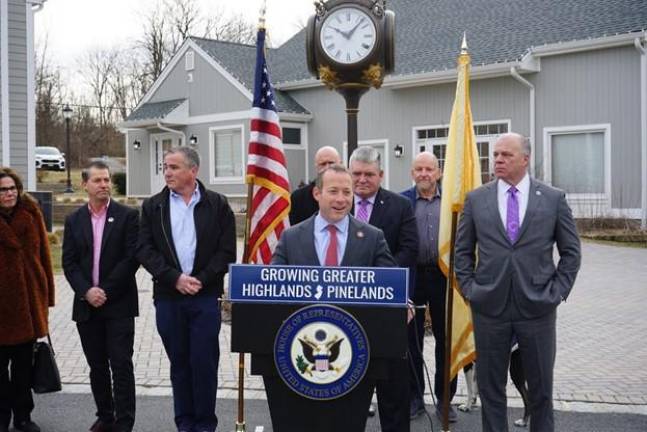Growing Greater Highlands
This week U.S. Rep. Josh Gottheimer (NJ-5), Senate President Steve Sweeney (LD-3), and Senator Steve Oroho (LD-24 in Lafayette Township announced their new bipartisan economic development plan for the Greater Highlands and Pinelands regions.

A new plan for boosting business, economic growth, and reducing taxes was revealed this week. On Thursday, U.S. Congressman Josh Gottheimer (NJ-5), and State Senators Steve Sweeney (LD-3), and Steve Oroho (LD-24) announced a new bipartisan economic growth plan to support New Jersey’s Greater Highlands and Pinelands regions by establishing a Rural Enterprise Zone. The plan includes reducing sales taxes and property taxes, boosting collaboration for the regions’ local businesses, and tasking the Highlands and Pinelands Councils with studying measures to improve economic growth in the region. This plan will continue protecting the environment while also helping to grow the economy.
Within the Greater Highlands and Pinelands regions, retail and investment growth have been stagnant, leading to a 7 to 10 percent decrease in property values, foreclosure rates nearly four times the national average, and contributing to New Jersey’s ranking as the top state in the nation for outmigration.
The Greater Highlands Region will consist of the existing Highlands Preservation and Planning Areas with an expansion into the remainder of Northern Warren and Sussex Counties.
“Given the explosion of eco-tourism and the remarkable potential here in the Greater Highlands and in the Pinelands, there is simply no reason why can’t create and attract more jobs and businesses to these regions, whether that’s new retail, experiential, tourism, high-skilled manufacturing, STEM jobs – you name it,” said Gottheimer. “With this bipartisan plan, we are encouraging tourism, helping job creation, supporting our local businesses, cutting both sales taxes and property taxes, and boosting the Greater Highlands economy at every angle.”
Sweeney (D-Gloucester/Salem/Cumberland), noted that while New Jersey has some of the most densely populated cities in the nation, it also has large swaths of rural communities, particularly in and around the Highlands and Pinelands.
“These areas have some of the highest unemployment rates in the state and often have very few options for public transportation," Sweeney said. "We have all supported efforts to grow the economies in our urban areas, but we need to grow in all areas of the state and expand local economic opportunities for all New Jerseyans.”
Oroho noted that it's called "Greater Highlands" because it's also the surrounding communities that are affected.
"When you go from the counties that have had some of the highest population loss to some of the highest foreclosure rates in the state, it’s hard to say that the economic viability has been maintained," Oroho said. "So, we’ve come up, and I want to thank the Congressman very much, who’s worked tirelessly for this, as he’s doing for Lake Hopatcong and all our different lakes in the area — but the idea of economic development and having a reduced sales tax rate, but also recognizing that one percent of that sales tax rate would go back to the counties for county-wide property tax relief.”